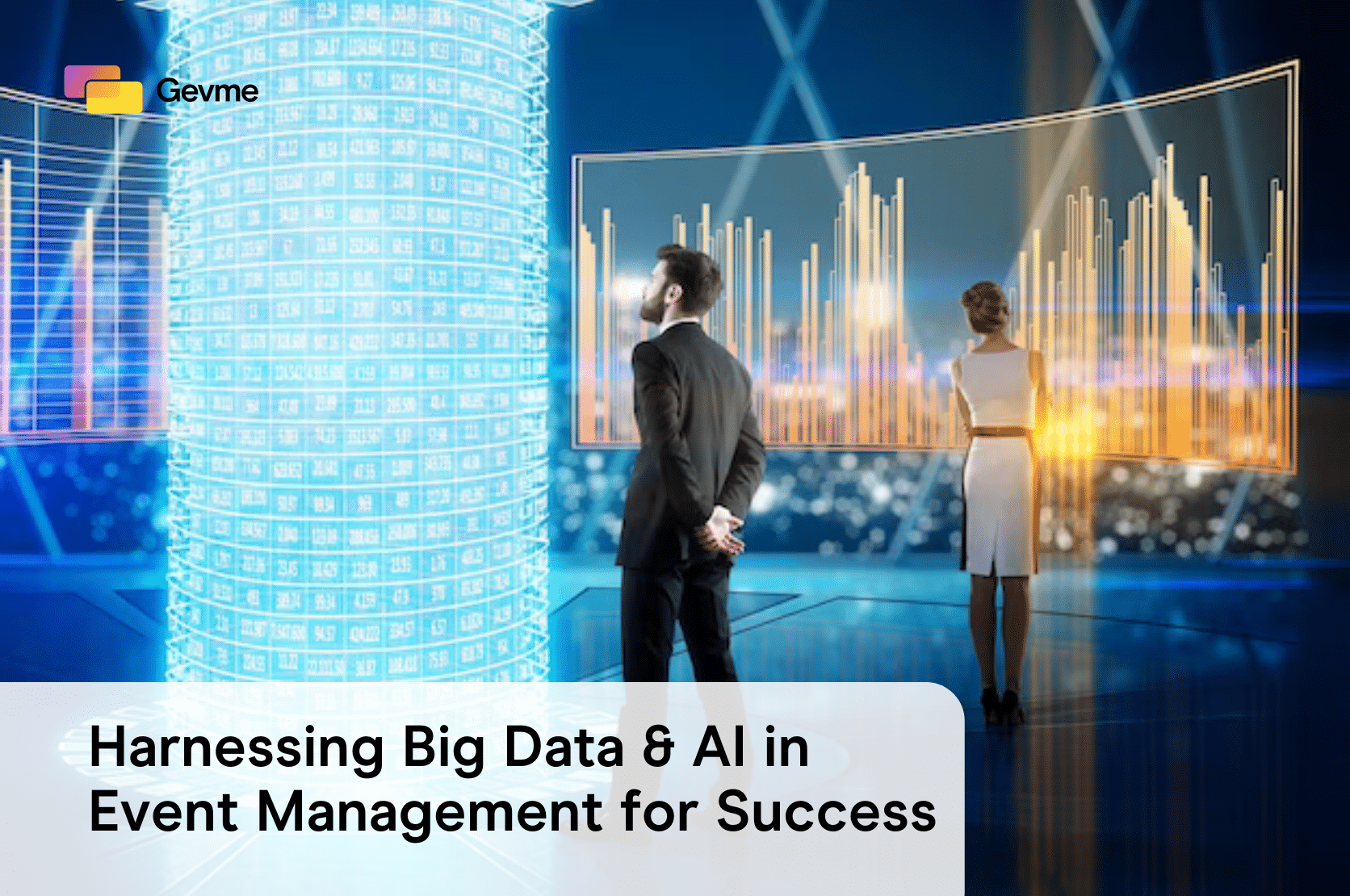In the evolving landscape of event management, the roles of Artificial Intelligence (AI) and Big Data are becoming increasingly significant. These technologies are transforming event strategies and execution processes, offering new levels of insight and efficiency. This blog will delve into how AI in event management and Big Data are revolutionising the industry, enabling more personalised experiences for attendees and streamlining operational logistics. We’ll explore the transformative capabilities of these technologies in setting new standards for event management excellence.

The Impact of Big Data and AI on Event Planning
The advent of AI in events and the use of Big Data have brought about a paradigm shift in event planning:
- Data-Driven Audience Insights: AI and Big Data delve deep into attendee data, uncovering patterns and preferences that were previously undetectable. This level of insight enables planners to create highly targeted and relevant event experiences, leading to increased engagement and a more satisfying attendee experience.
- Enhanced Market Analysis: Through sophisticated market analysis, these technologies help identify emerging trends, key audience segments, and potential growth areas. This crucial information assists in accurately targeting and positioning events, ensuring they resonate with the intended audience and capture market opportunities effectively.
- Dynamic Event Customization: The role of AI in events allows for dynamic customisation of events based on live data analysis. This means that events can evolve in real time, adapting content and experiences to match the changing interests and engagement levels of attendees, ensuring a continually relevant and captivating event.
- Predictive Modelling for Event Success: Predictive modeling provides foresight into the potential success of various event strategies. This capability allows planners to make more informed decisions, from marketing approaches to content and speaker selection, thereby enhancing the probability of event success.
- Streamlined Venue and Supplier Selection: The process of selecting venues and suppliers is greatly enhanced by AI-driven tools. These tools analyze numerous criteria, from cost to location to suitability, ensuring that the chosen venues and suppliers align perfectly with the event’s objectives and constraints.
- Budget Optimization: In budget management, AI in event management offers an unprecedented advantage. It provides accurate forecasts for costs and potential returns, allowing for the strategic allocation of resources and maximizing the financial effectiveness of the event.

Personalization of Attendee Experiences
AI in events and Big Data have greatly enhanced the personalisation of attendee experiences:
- Individualized Content Recommendations: Advanced AI algorithms in events look through extensive attendee data to provide highly personalised content recommendations, significantly enhancing the relevance and appeal of sessions, workshops, and activities, ensuring that each attendee’s interests are catered to.
- Customized Communication Strategies: Leveraging Big Data, event planners can craft highly personalised communication strategies. This means tailored marketing messages, updates, and notifications are sent based on the unique preferences and behaviours of each attendee, increasing engagement and satisfaction.
- Dynamic Attendee Engagement: AI-driven tools adapt engagement strategies in real-time, based on live attendee interactions and feedback. This dynamic approach ensures that the event experience remains engaging and responsive to attendees needs.
- Personalized Networking Opportunities: Utilizing AI in events for networking transforms how attendees connect. By analyzing shared interests and professional backgrounds, AI tools facilitate meaningful connections, enhancing the networking value of the event.
- Enhanced Attendee Journey Mapping: With Big Data and AI in event management, planners can track and analyze individual attendee journeys throughout the event. This insight allows for a deeper understanding of attendee behaviours and preferences, enabling even more personalized experiences.
- Predictive Personalization: The predictive capabilities of and AI in event management anticipate future attendee preferences and behaviors. This foresight enables event planners to proactively tailor aspects such as session topics, catering choices, and seating arrangements to enhance the attendee experience.

Enhancing Decision-Making with Data-Driven Insights
The integration of AI in event management and Big Data significantly enhances strategic decision-making:
- Strategic Planning with Predictive Insights: Big Data and AI in event management extend beyond basic predictions, delving into nuanced aspects like attendee psychographics, potential networking connections, and even predicting the likelihood of future industry trends affecting the event’s success.
- Real-Time Decision Making: The real-time analytics facilitated by AI go far beyond mere attendee tracking, offering insights into engagement levels at different event stages, enabling organizers to dynamically shift focus, whether it’s reallocating resources or adjusting schedules.
- Optimizing Marketing and Outreach: AI in event management enables advanced data-driven strategies for deep segmentation of the target audience, crafting highly individualized marketing messages that resonate on a personal level, and optimizing outreach channels for maximum engagement.
- Venue and Logistic Decisions: AI and Big Data’s role in venue selection encompasses analyzing historical data on attendee flow patterns, preferences for certain layouts, and even predicting potential logistical bottlenecks.
- Session and Speaker Selection: AI’s contribution here includes analyzing past speaker performance, audience reception, and current industry trends to propose a lineup that not only educates but also inspires and entertains attendees.
- Post-Event Analysis for Future Improvement: The post-event analysis goes beyond standard feedback, using AI to correlate attendee satisfaction with specific event aspects, providing a comprehensive roadmap for continuous improvement in future events.

Operational Efficiency and Logistics Management
The role of AI in events and Big Data are significantly enhancing operational efficiency in event management:
- Streamlining Registration Processes: AI deeply enhances the registration process by analyzing attendee data for personalized experiences, automating complex workflows like group registrations, offering intelligent suggestions for sessions and activities, and managing attendee queries through AI chatbots.
- Optimizing Event Layout and Flow: Big Data aids in meticulously planning event layouts, considering factors like historical attendee movement patterns, predicted attendance fluctuations, and even the impact of different layouts on attendee engagement and satisfaction.
- Enhanced Resource Management: AI’s resource management extends to predicting the optimal number of staff required at different event stages, ensuring efficient use of audio-visual equipment, and dynamically adjusting resources like seating and catering based on real-time attendee numbers.
- Automated Vendor Coordination: AI streamlines vendor coordination by automating order placements, tracking deliveries, managing inventory, and providing real-time updates on vendor performance, ensuring that all services align seamlessly with the event timeline.
- Logistics Optimization: Big Data plays a pivotal role in comprehensive logistics planning, including optimizing transport routes for attendees, forecasting accommodation needs, and planning for contingencies like traffic or weather disruptions.
- Emergency and Risk Management: AI and Big Data enhance emergency preparedness by simulating various risk scenarios, enabling real-time monitoring of potential risks, and automating emergency communication protocols to ensure rapid response in any situation.
Impact of AI and Big Data on Event Sponsorship
Big Data and AI in events are significantly transforming sponsorship:
- Targeted Sponsor Matching: AI’s advanced matching capabilities consider not just industry alignment but also deeper factors like audience sentiment towards potential sponsors, previous sponsorship successes, and predictive modelling on potential audience engagement.
- Enhanced Sponsor Value: The deep insights provided by Big Data extend beyond basic demographics, encompassing attendee preferences, spending habits, and engagement patterns, allowing for highly targeted sponsor messaging and activations that resonate strongly with attendees.
- Predictive Sponsorship Outcomes: AI’s predictive analytics offer comprehensive projections, including potential reach, engagement metrics, and even anticipated audience sentiment, aiding both sponsors and organizers in strategizing effectively.
- Automated Sponsor Engagement: AI streamlines sponsor relations, managing everything from initial outreach and personalized proposals to ongoing communications and real-time adjustments based on sponsorship performance.
- Data-Driven Sponsorship Packages: The creation of sponsorship packages based on Big Data includes tailored options that align with sponsors’ branding, target markets, and specific campaign goals, ensuring a high value proposition.
- ROI Measurement and Reporting: AI and Big Data’s role in ROI measurement involves detailed tracking and analysis of sponsor visibility, attendee engagement with sponsored content, and overall impact on sponsor brand recognition and sentiment.

Challenges and Solutions in Integrating Big Data and AI in Events
Integrating Big data and AI in event management comes with challenges:
- Data Privacy and Security Concerns: Ensuring data privacy and security in AI and Big Data involves not just adhering to regulations like GDPR, but also implementing advanced encryption, regular security training for staff, and conducting frequent vulnerability assessments. A proactive approach to privacy includes transparent data policies and educating attendees on data use.
- Overcoming Technical Limitations: Addressing technical challenges involves not only upgrading hardware and software but also ensuring interoperability between different systems and platforms. This might include integrating legacy systems with modern AI solutions and ensuring scalable infrastructure that can handle large volumes of data efficiently.
- Ensuring Data Accuracy and Quality: High data accuracy is critical. This involves employing advanced data validation techniques, leveraging technologies like machine learning for data cleansing, and setting up feedback loops for continuous data quality improvement.
- Balancing Automation and Human Insight: Achieving a balance requires developing a culture where technology complements human skills. This involves continuous training, fostering collaboration between AI experts and event planners, and developing protocols where human decision-making is prioritized in critical scenarios.
- Cost and Resource Management: Managing costs effectively involves a long-term view of technology investment, considering the total cost of ownership of AI and Big Data technologies. This includes not just the initial setup cost but also ongoing maintenance, upgrades, and training expenses.
- Staying Ahead of Evolving Technologies: To stay ahead, continuous professional development is key. Subscribing to industry publications, participating in tech think-tanks, and fostering a culture of innovation within the organization can help keep pace with rapid technological advancements.
Future Trends and Predictions
As we look towards the horizon of event management, Big Data and AI in events are poised to introduce groundbreaking changes:
- Advanced Predictive Analytics: The future of predictive analytics in AI and Big Data will likely encompass complex attendee behaviour modelling, enabling event planners to not only forecast attendance and preferences but also to predict attendee responses to different event scenarios, enhancing strategic planning and marketing efforts.
- Enhanced Real-time Interaction: Future AI-driven real-time interactions could include sophisticated features like AI-powered virtual assistants providing personalized guidance to attendees, interactive polls and quizzes adapted to audience responses, and dynamic content modification to reflect real-time feedback, ensuring a highly interactive and engaging event environment.
- Integration of Emerging Technologies: The integration of AI with AR and VR technologies is expected to create unparalleled immersive experiences. This could involve virtual event spaces that replicate real-world venues, AI-guided AR tours of exhibition areas, and even VR networking spaces where attendees can interact in a virtual environment that mimics physical presence.
- Sustainable Event Management: AI and Big Data are set to become crucial in driving sustainability in events. This could involve AI-driven resource optimization, predictive analysis for waste reduction, and data-driven strategies for minimizing carbon footprints, contributing to the global push towards more eco-friendly events.
- Deeper Personalization: AI’s future in personalization is expected to extend to creating entirely unique attendee experiences, where every touchpoint is tailored. This includes personalized event itineraries, AI-curated content and sessions, and even custom-tailored networking opportunities based on deep learning analysis of attendee profiles.
- Autonomous Event Operations: The advent of fully autonomous event operations is on the horizon, where AI systems could manage end-to-end event planning and execution, including autonomous coordination with vendors, AI-driven onsite management, and even automated post-event follow-ups, significantly transforming the role of event professionals.

Gevme: AI and Big Data
Gevme effectively utilizes AI and Big Data to streamline and enhance various aspects of event management, offering robust solutions for event registration, and handling complex scenarios with automated workflows, and customizable forms. Gevme also provides comprehensive tools for onsite management, engagement, and virtual event hosting, integrating cutting-edge AI to ensure high attendee engagement and efficient event execution. These demonstrate the practical application of AI and Big Data in transforming event strategy and execution, offering insights into the future possibilities in the industry.
Conclusion
It’s evident that Big Data and AI in events are catalysts for transformative change in event management. Their impact spans from enhancing attendee experiences to optimizing operational efficiency. Embracing these technologies is essential as the event industry evolves. The future, shaped by AI and Big Data, promises more personalized, efficient, and impactful events, leading us on a path of continuous adaptation, learning, and innovation.








